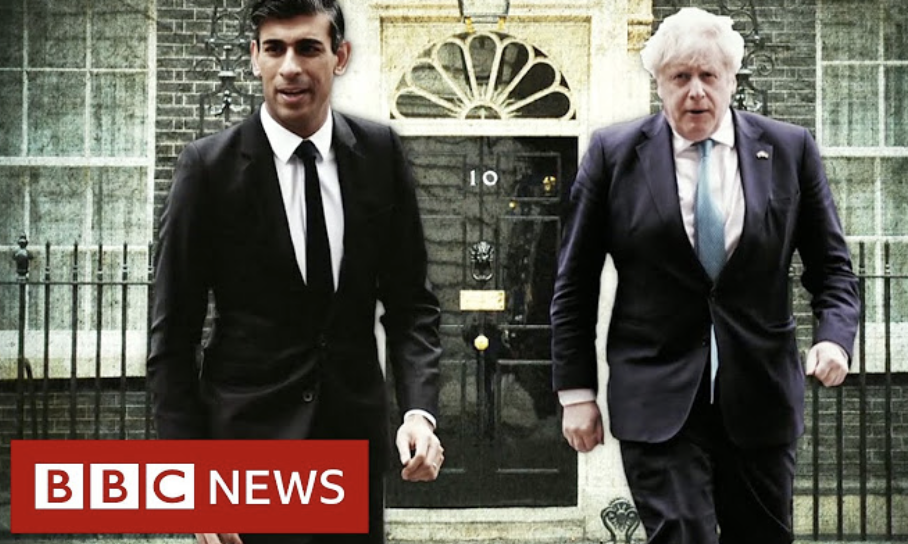Conservatives go down to a big defeat in the UK: what that tells us about the US

Trump, institutions, and arbiters of truth in the US and UK
This week the UK Labour Party won a huge, landslide victory. That’s a big shift from just 5 years ago, when UK Conservatives won a majority in the 2019 elections. What drove the big change in support for the conservatives in the UK, and why we don't see similar changes in the US? What I see is that the countries have different media and therefor different information environments, and there are arbiters of truth in the UK that don't exist in the US.
Below are two charts. One tracks the approval of the major left (Labour) and right (Tory/Conservative) parties in the UK. Support for the Conservative party has absolutely imploded over the past few years. Compare to the second chart, which shows Donald Trump's approval ratings. The remarkable feature is that Trump's favorability is almost flat. It's been mostly between 40% and 44% since 2017. And since 2017, there was an insurrection unprecedented in American history.


Trump favorability is not the same as support for a party, but another feature of US politics since 2016 is that there have been only small changes in national election support for Democrats and Republicans. Even the shift after the Dobbs decision was not nearly as large as the changes we see in the UK. That's not due to a lack of scandalous behavior. The right in Britain mishandled COVID if anything less poorly than Trump mishandled it. Trump coordinated with a coup. The Mueller report said the Trump campaign had worked with a foreign power hostile to the US. Yet Trump support has changed little. This has been the topic of much discussion in the US press.
In contrast, support for politicians on the UK right has imploded. Boris Johnson was pushed out, and Liz Truss lost a race to stay viable with a head of lettuce.
Public opinion stasis hasn't always been the case in America: George W. Bush's approval rating went from 90% in 2001 to as low as 25% in 2008. So what's changed in the US in the past 20 years that hasn't changed in the UK?
Let me put forth a hypothesis: It’s the different information environments. And in particular, a big difference is the existence of the BBC in the UK.
There are lots of differences between US and UK journalism and media. But the BBC is the most trusted news source in Britain (2023 YouGov poll, 44%). And it has no paywall. Democracy dies in darkness, as they say.
Because of its trust level and availability, the BBC can act as an arbiter of truth for the British public.
The BBC has a lot of problems too. It's afflicted by the bothsidesism problems that afflict US mainstream political media. And it has at times bent towards the Tories, due perhaps to Conservative appointees, and also due to the right's public campaigns of 'liberal bias.' Still, when conservatives screw up, the BBC can and does hold them accountable. The BBC can drive public debate, and it can generate rough agreement on facts across a majority of the public.
When Johnson faced a scandal based on lying about throwing parties while the rest of the county was under COVID lockdown, the BBC wrote about "a report that demolishes Boris Johnson's character and conduct... Let's be blunt: it says he lied." This message reached a good fraction of the UK public. The proof is in the pudding: it is now widely accepted as truth that this was a scandal, with bad acts by Johnson. Johnson's approval rating was at 25% in 2022 according to YouGov. There are many reasons for Tory loss in support over the last few years, but a big part of it appears to be that being held to account for these offenses destroyed public confidence in both Johnson and his party.
(We should also note that the UK legislature ran an investigation of this scandal, keeping it in the headlines. There are some lessons in this for the US, too.)
The US media sphere in 2024 is far different than this. There is widespread political misinformation on Twitter, we have a robust rightwing media that jumps into action to block any emerging public consensus that Republicans have problems, and we have a bothsides mainstream centrist press that does not speak clearly about the parties. The political desks at those centrist outlets — including CNN, MSNBC, the New York Times and the Washington Post — have not spoken clearly about Trump and Republicans the way the BBC has spoken clearly about Johnson and the Tories.
Does this mean US journalists are merely chasing money and don't care about democracy? That's not what I'm saying. It's that the incentive structures for US media are broken. I'll quote two smart people about this. David Roberts wrote about it on Twitter this week. He says, "Dwelling on Trump & his fascist movement – however justified by the objective facts – just doesn't bring that juice, doesn't get the clicks & the high-fives, doesn't feel brave & iconoclastic. It's just ... no fun." That's right. Brian Beutler, another insightful observer of structural forces, described the US media environment in October, saying "with rare exceptions, [journalists] are not thinking about money... but [if the US media ignored a fake scandal] because the party running it is using it as a fog machine to mislead the public ... [that would be] just leaving audience on the table." On the importance of audience and attention to US journalists, he says "every reporter I know, including me, has felt pressure to bring back stories that are ... sellable in some way." That pressure does distort the US information environment.
This week, the UK Conservatives got trounced. That was a huge shift from just a few years ago. No such shift of public opinion is happening in the US, despite scandals of larger import here in the US. A big reason for that difference is the BBC. The BBC can and does act as an arbiter of truth in the UK.
I'm not saying we should build a BBC in the US. There are other kinds of public policy that can improve US news. But we should be thinking more about how to structure our information environment to make it better at conveying what's happening in politics.
Responses to a few questions I've gotten:
- It wasn't the switch from Corbyn to Starmer that produced the UK shift. Starmer's approval has been down around 30% at times. This is shift in party brand.
- A friend asked me if NPR in the US doesn't play the same role as the BBC in the UK. No, it's not close. Quick hit: funding for NPR is about one hundred times less per capita than funding for the BBC.
